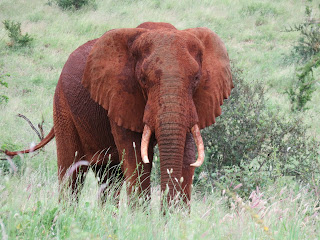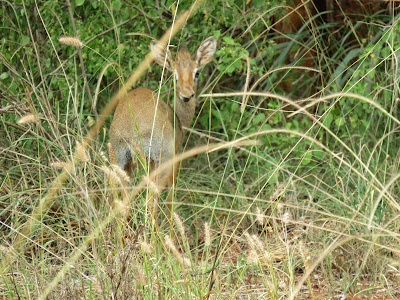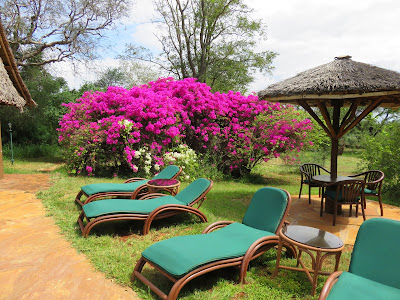Saturday & Sunday, May 23-24,
2015
While driving back to Nairobi from
Mtito Andei we saw about 8-12 giraffe right next to the highway feeding on some
trees. This is not totally unusual, but
also not all that common. Unfortunately
I was on the wrong side of the car to take a picture and we were traveling too
fast.
It has rained almost every night
in Nairobi since we’ve been here. It
convinces one never to venture out in the evening because when it rains the
traffic gets to be ridiculous. So when
we travel the last time to the airport, even though our flight doesn’t leave
till very late at night, we will be driving there in the afternoon so as to
miss the rain and the traffic that would probably make us miss our flight. All I know is that the evening we tried to retrieve
our luggage we heard that many people missed their evening flights—not
surprising since we couldn’t even get out of the city in 5 hours.
It feels good to relax for a few
days and finally get to go to church.
Each day seems to bring new
‘glitches’ to our schedule, caused by traffic.
E/S Shakespeare were to be picked up and taken to the airport by one of
the drivers that the mission office uses.
He was supposed to pick them up at 9 AM.
By 9:30 they decided that they would never make it to the airport if
they waited for him so enlisted Jim.
Mind you, this is English style driving and all the landmarks and many
roads have changed since we’ve driven here.
Jim has no idea where we are going when Elder Shakespeare is driving and
is usually lost. So he saw Sampson, the
young man that used to wash our truck, and had him jump in the car so that he
could find his way back again.
Sampson: we saw him briefly when
we first arrived last weekend in Nairobi after our trip to Tanzania. Sampson has since married and has two
children. His father was an alcoholic
and now, so is he. He is also smoking
and the people here wonder if he is on drugs.
It has spoiled his chances for making money, and they had trained him in
a nice vocation several years ago, installing drapes. He also is involved in some projects in the
slums. His alcoholism has begun to erode
his relationship with the couples and those the church is working with, so that
they are pushing him out of that also.
When we lived here we became quite close to Sampson. So when he saw us and Jim gave him a hug, told
him we knew of his problems, he bawled like a baby. Africans rarely show this much emotion. I told him that the only way he could get rid
of his addictions is to go to church and start reading his scriptures. The church has no addiction recovery programs
here. They need one for the Chyulu Hills
area also, and probably a few other areas.
But of course, the person has to have the desire to change and they
usually need a lot of help.

On the way home from church I was finally able to take a few
pictures. This is the lightest traffic
day of the week. Who would have believed
that Nairobi would have freeway signs, that they would have signals, that they
would have signs marking their roads?
This part of road construction was done by the Chinese and under the former
President Kibaki. There are walking
bridges, road bridges, tunnels, and lots of building going on all over the
place—tall buildings, apartments, all kinds of businesses, Athi River has grown
tremendously.

While Jim was at the airport I
waited for Sarah who was going to accompany us on our errands so we wouldn’t
get lost. She was to arrive at 10, but
again, was much later because of the awful traffic. Give me the 405 ‘parking lot’ (freeway) any
day—nothing is as bad as trying to get around in Nairobi and in Tanzania these
days. She showed up close to 11 but I
was surprised that Jim didn’t take all day to get back from the airport. He decided to have her drive again because he
already had a headache from driving from the airport, but he made it okay. We got more groceries, had lunch, and returned
back to the flat in a reasonable amount of time.
Pictures below: overpass,
walking overpass, driving into a tunnel.
Sunday Sarah picked
us up for church and we went to the Kasarani Ward, which has been split, but we
still saw Victor and his wife and also David, who used to make furniture for
the schools we worked in. Last time
Victor was in the Bishopric but after the change David is now in the Bishopric—both
good men. We saw others that we
knew. We wanted to talk with David about
building a sign board for Sarah’s nursery school; he gave her a better price
than she was given by others and also told her she needed a permit to put it up
and the way it needed to be made. We had
a great meeting. These people give
wonderful talks without the aid of a single note…they quote scriptures and know
where they are. This is always
impressive. The friendliness of the Ward
was also exceptional.
With all of these changes you’d
think that one could get around better.
It seems that along with road progress, many more people can afford
cars. They continue to work on sections
of roads to widen them, but nothing seems to help the congestion.
This should continue to be a
relaxing week—obviously, without the Shakespeare’s here we don’t have quite as
much to do as we would have.
Love, mom & dad, E/S Greding,
Jim and Karen

















































